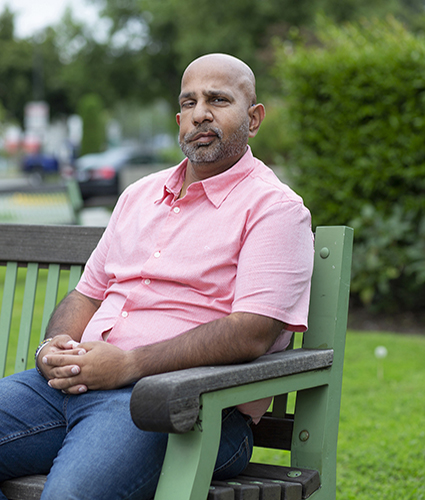
Vikram Bubber
When Vikram Bubber was just five years old, he began to have issues with his right ear. It turned out to be cancer.
A life-long battle with health issues followed, which deeply impacted Vikram both personally and professionally. Despite this, or more likely because of it, he chose a life of giving back. Vikram has been a cancer advocate for more than 30 years.
“I’m happy with the way things are right now,” says Vikram. “I spend my time volunteering and giving back.”
Vikram has volunteered with numerous organizations. In addition to the Kwantlen Polytechnic University Alumni Association, he has given his time to the Terry Fox Foundation, BC Cancer Agency, BC Children’s Hospital, and most recently, Patient Voices Network and the Make-A-Wish Foundation BC & Yukon. Much of his volunteer work is as a motivational speaker. He has a story to tell and it’s not always an easy one to listen to.
After two years of radiation and chemotherapy treatments as a child, the cancer in his ear was eradicated, but there was a cost. He has profound hearing loss in his right ear and partial hearing loss in his left. The same radiation that cured his childhood cancer caused a bone tumour to develop more than 20 years later in Vikram’s right cheekbone. Once again, he underwent chemotherapy treatments, and eventually had surgery to remove much of the cheekbone. For three years Vikram was unable to open his mouth more than a centimetre. A piece of his leg bone was grafted into the space during reconstructive surgery and fat was injected to make his facial contours more natural. Eventually Vikram was able to open his mouth fully and enjoy eating once again.
He’s become one of the most engaged patient partners, by speaking at different post-secondary institutions and working on several committees within different health authorities and organizations locally & nationally. He regularly gives talks to nursing students on his experiences. Recently he spoke to radiation therapy students and at the University of British Columbia to dental students in a patient education program.
“I tell them it’s so important to treat your patient as a human being and not an object,” says Vikram. “I want to change the status quo because I feel like that was why I was given a second chance at life. I just feel like this is my niche, where I belong. I don’t belong in a nine-to-five job behind a computer. I’ve had a few bumps along the way, but that’s life.”